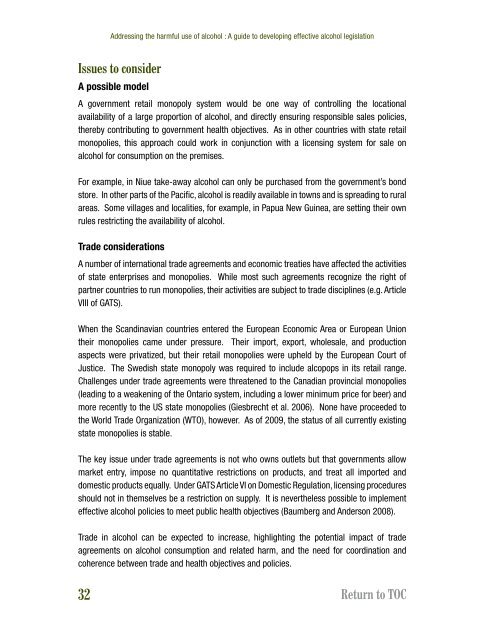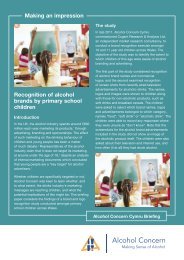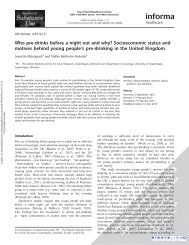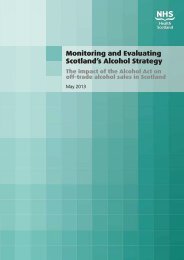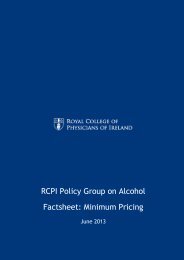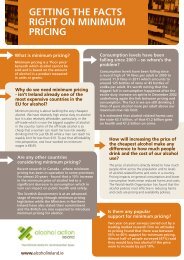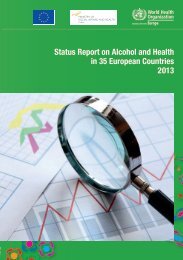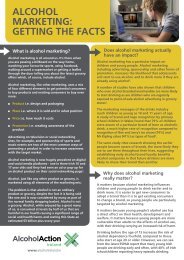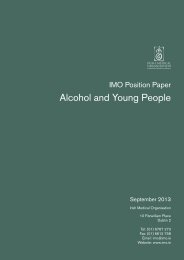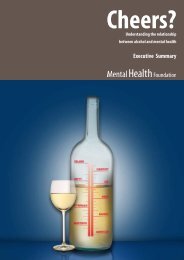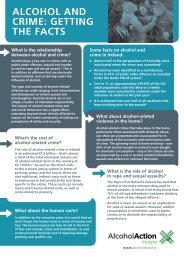Addressing the harmful use of alcohol - WHO Western Pacific Region
Addressing the harmful use of alcohol - WHO Western Pacific Region
Addressing the harmful use of alcohol - WHO Western Pacific Region
You also want an ePaper? Increase the reach of your titles
YUMPU automatically turns print PDFs into web optimized ePapers that Google loves.
<strong>Addressing</strong> <strong>the</strong> <strong>harmful</strong> <strong>use</strong> <strong>of</strong> <strong>alcohol</strong> : A guide to developing effective <strong>alcohol</strong> legislation<br />
Issues to consider<br />
A possible model<br />
A government retail monopoly system would be one way <strong>of</strong> controlling <strong>the</strong> locational<br />
availability <strong>of</strong> a large proportion <strong>of</strong> <strong>alcohol</strong>, and directly ensuring responsible sales policies,<br />
<strong>the</strong>reby contributing to government health objectives. As in o<strong>the</strong>r countries with state retail<br />
monopolies, this approach could work in conjunction with a licensing system for sale on<br />
<strong>alcohol</strong> for consumption on <strong>the</strong> premises.<br />
For example, in Niue take-away <strong>alcohol</strong> can only be purchased from <strong>the</strong> government’s bond<br />
store. In o<strong>the</strong>r parts <strong>of</strong> <strong>the</strong> <strong>Pacific</strong>, <strong>alcohol</strong> is readily available in towns and is spreading to rural<br />
areas. Some villages and localities, for example, in Papua New Guinea, are setting <strong>the</strong>ir own<br />
rules restricting <strong>the</strong> availability <strong>of</strong> <strong>alcohol</strong>.<br />
Trade considerations<br />
A number <strong>of</strong> international trade agreements and economic treaties have affected <strong>the</strong> activities<br />
<strong>of</strong> state enterprises and monopolies. While most such agreements recognize <strong>the</strong> right <strong>of</strong><br />
partner countries to run monopolies, <strong>the</strong>ir activities are subject to trade disciplines (e.g. Article<br />
VIII <strong>of</strong> GATS).<br />
When <strong>the</strong> Scandinavian countries entered <strong>the</strong> European Economic Area or European Union<br />
<strong>the</strong>ir monopolies came under pressure. Their import, export, wholesale, and production<br />
aspects were privatized, but <strong>the</strong>ir retail monopolies were upheld by <strong>the</strong> European Court <strong>of</strong><br />
Justice. The Swedish state monopoly was required to include alcopops in its retail range.<br />
Challenges under trade agreements were threatened to <strong>the</strong> Canadian provincial monopolies<br />
(leading to a weakening <strong>of</strong> <strong>the</strong> Ontario system, including a lower minimum price for beer) and<br />
more recently to <strong>the</strong> US state monopolies (Giesbrecht et al. 2006). None have proceeded to<br />
<strong>the</strong> World Trade Organization (WTO), however. As <strong>of</strong> 2009, <strong>the</strong> status <strong>of</strong> all currently existing<br />
state monopolies is stable.<br />
The key issue under trade agreements is not who owns outlets but that governments allow<br />
market entry, impose no quantitative restrictions on products, and treat all imported and<br />
domestic products equally. Under GATS Article VI on Domestic Regulation, licensing procedures<br />
should not in <strong>the</strong>mselves be a restriction on supply. It is never<strong>the</strong>less possible to implement<br />
effective <strong>alcohol</strong> policies to meet public health objectives (Baumberg and Anderson 2008).<br />
Trade in <strong>alcohol</strong> can be expected to increase, highlighting <strong>the</strong> potential impact <strong>of</strong> trade<br />
agreements on <strong>alcohol</strong> consumption and related harm, and <strong>the</strong> need for coordination and<br />
coherence between trade and health objectives and policies.<br />
32 Return to TOC


